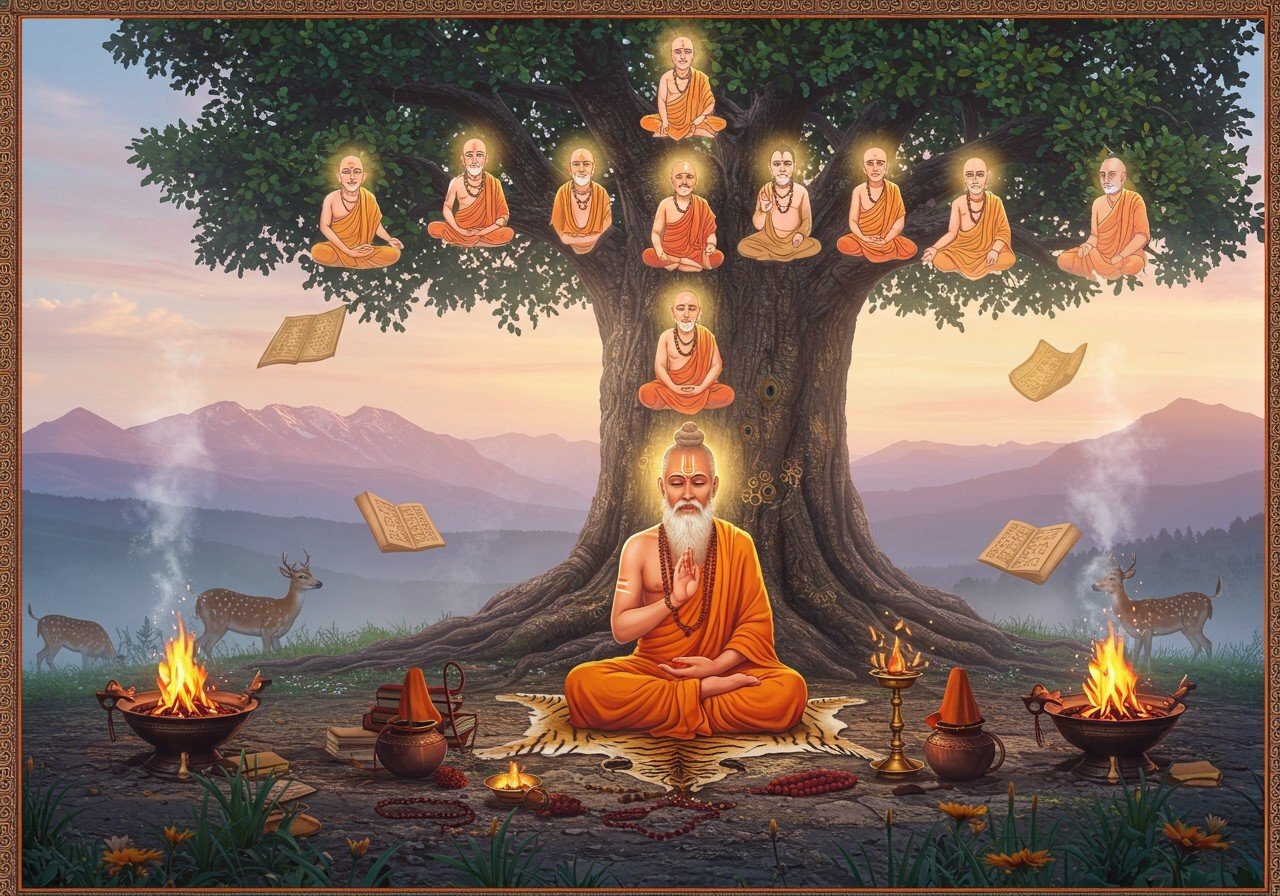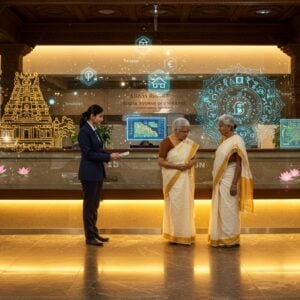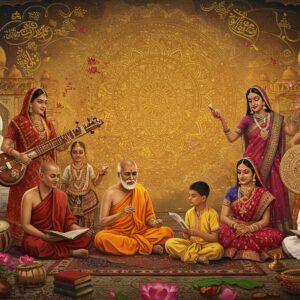
In the tapestry of Hindu culture, the concept of Gotra holds deep significance. It’s a lineage system, a way of tracing our ancestral roots back through time to the revered Rishis, the sages of ancient India. The Vamadeva Gotra, in particular, carries a special resonance, echoing with the legacy of the esteemed sage Vamadeva. This blog post delves into the origins and cultural relevance of the Vamadeva Gotra, offering a glimpse into its role in sacred rituals and social identity within the vibrant mosaic of Indian tradition.
What Does Gotra Mean?
Gotra, at its heart, signifies a lineage or clan, a familial thread woven through generations, based on paternal ancestry. It connects us to the ancient Rishis of Vedic times. Within Hindu society, Gotras are passed down, preserving family histories and contributing to social harmony. They play a vital role in matrimonial alliances, as traditionally, marriages within the same Gotra are avoided. The significance of Gotras is deeply intertwined with the Varnashrama Dharma, the social framework of Hinduism. Truly, understanding your Gotra is key to upholding cultural continuity and a sense of belonging.
Tracing the Origins of the Vamadeva Gotra
The Vamadeva Gotra finds its roots in the venerable Sage Vamadeva, a highly respected Rishi in Hindu scriptures. Renowned for composing hymns in the Rigveda, Sage Vamadeva’s contributions to our spiritual heritage are immense. The Vamadeva Gotra, descending from this enlightened sage, carries a profound spiritual weight. Variations in the name, such as Vamadeva Gothram and Vamadeva Gautama, reflect the rich diversity of regional nuances. Through cherished oral traditions and ancient texts, the lineage and stories of Vamadeva have been carefully preserved, flowing through the heart of India across centuries.
Cultural Significance and Sacred Rituals
In our contemporary world, the Vamadeva Gotra continues to hold a place of honor and cultural importance. Rituals and ceremonies specific to this lineage are still practiced with devotion, connecting us to our ancestors. Certain festivals and religious occasions revolve around the Vamadeva Gotra, strengthening the bonds of family and tradition. Families lovingly transmit these traditions through generations, nurturing a powerful sense of shared identity. In today’s digital age, online resources also play a vital role in preserving and celebrating this precious heritage, fostering connections and cultural exchange.
Relevance in Modern Times
Even today, amidst the hustle and bustle of modern life, the Vamadeva Gotra remains remarkably relevant. Younger generations are actively engaging with these traditions, often embracing technology and online platforms as valuable tools for connection. While globalization presents its challenges, countless families are successfully preserving their heritage. Urbanization and migration have undoubtedly impacted the continuity of certain practices. However, dedicated cultural organizations are working tirelessly to promote awareness and appreciation. Engaging with our Gotra heritage offers a meaningful way to connect with our past while navigating the present, seamlessly blending tradition with contemporary living.
Vamadeva: A Sage Revered Through Time
Sage Vamadeva occupies a position of deep reverence in Hindu literature. He is credited with composing Mandala 4 of the Rigveda, a testament to his profound spiritual insight. The Upanishads, such as the Brihadaranyaka and Aitareya, also speak of his wisdom. Vamadeva is described as the son of Sage Gotama and brother of Nodhasa. According to Pargiter, he belongs to the lineage of Sage Angiras and is the father of Brihaduktha. His legacy continues to inspire generations.
The Role of the Gotrakarins
Vamadeva Gautama Maharishi is considered one of the esteemed sages (Gotrakarins) from whom Gotras have evolved, particularly among Brahmins. His influence on numerous lineages is undeniable, shaping the spiritual landscape of countless families. Learn more about the significance of deities and rituals.
A Divine Connection: Lord Vamdev
A captivating narrative speaks of the divine presence of Lord Vamdev during the thirtieth kalpa known as Rakta. As Lord Brahma meditated on Parameshthi Shiva, a divine child of red complexion, adorned in red attire, appeared before him. This was none other than Lord Vaamdev, the embodiment of the Almighty. Lord Brahma instantly recognized the divinity of the child. This story underscores the deep spiritual connection associated with the Vamadeva lineage.
Poojn.in: Supporting Vamadeva Gotra Rituals
At poojn.in, we understand the importance of honoring your heritage. We offer a wide selection of authentic puja items specifically chosen to support families of the Vamadeva Gotra in their rituals and ceremonies. Explore our collection of exquisitely crafted murtis.
Our offerings include:
- Pure copper and brass items for daily puja, ensuring purity and authenticity in your worship. Crafted with meticulous detail, these items elevate the sanctity of your daily rituals.
- Traditional dhoop and agarbatti, prepared according to Vedic specifications, filling your home with sacred fragrances that enhance your spiritual practice. Our incense sticks are made with natural ingredients, ensuring a pure and uplifting experience.
- Specialized puja kits containing everything you need for gotra-related ceremonies, simplifying your preparations and allowing you to focus on the spiritual significance of the occasion. Each kit is thoughtfully curated with all the essential items.
- Sacred threads (janeu/yagnopavit) meeting Vamadeva Gotra requirements, ensuring that you have the appropriate sacred items for your specific lineage. Our sacred threads are made with the utmost care and respect for tradition.
- Guidance on the proper performance of rituals. Consult our experts via phone (03369029784) or WhatsApp (9476142738). We’re here to assist you every step of the way. Our knowledgeable team provides personalized support to help you understand and perform rituals correctly.
All our products come with detailed instructions in multiple languages. Our team verifies the authenticity and ritual suitability of each item before it’s listed. We deliver across India with secure packaging to maintain the sanctity of your purchases.
Acquire a Vamavarti Shankh for your puja needs.
For personalized guidance on Vamadeva Gotra rituals or to order customized puja items, please contact our experts:
- Phone: 03369029784
- WhatsApp: 9476142738
Visit www.poojn.in to discover our comprehensive collection of ritual items and puja essentials for Vamadeva Gotra ceremonies.
Embracing the Legacy: Vamadeva Gotra
The Vamadeva Gotra stands as a testament to the enduring power of wisdom and tradition. It is a living link connecting families to the ancient sage Vamadeva, whose spiritual contributions continue to inspire. This Gotra embodies the very essence of cultural identity, providing a profound sense of belonging and continuity. By understanding and honoring these traditions, we connect deeply with our ancestral heritage, enriching our lives in countless ways.
Embark on a spiritual journey. Explore Jyotisar Sarovar.
In today’s world, the harmonious blend of tradition and modernity enhances our lives immeasurably. Embracing the Vamadeva Gotra allows us to cherish our roots while navigating the complexities of contemporary life. By engaging with these timeless values, we ensure their preservation for future generations. As we celebrate our lineage, we contribute to the vibrant tapestry of Indian culture, fostering a deep appreciation for our shared history and spiritual heritage.
Frequently Asked Questions about Vamadeva Gotra
What does Vamadeva Gotra signify? Vamadeva Gotra represents a distinct lineage within the Hindu community, tracing its ancestry back to the revered sage Vamadeva, one of the Saptarishis. This lineage carries deep spiritual and cultural significance, connecting individuals to a rich heritage.
Is there a difference between Vamadeva Gotra and Vamadeva Gautama? While both names refer to the lineage of Sage Vamadeva, “Vamadeva Gotra” broadly denotes the lineage itself. “Vamadeva Gautama” may indicate a specific branch or family within the Gotra that also identifies with Sage Gautama, adding another layer of ancestral connection.
Why is Gotra important in Hindu traditions? Gotra holds immense cultural significance in Hinduism, representing a person’s ancestral heritage. It plays a crucial role in rituals, ceremonies, and especially marriages, ensuring the continuity and respect of lineage within the community. Understanding one’s Gotra is essential for upholding tradition and social harmony.
How can I determine my Gotra? Traditionally, Gotra is passed down patrilineally. You can typically discover your Gotra by inquiring with family elders or consulting family records. These sources often preserve valuable genealogical information passed down through generations.
Is Vamadeva Gotra associated with any particular sect or community? The Vamadeva Gotra is not limited to a single sect or community within Hinduism. It spans across various Hindu communities whose members trace their lineage to Sage Vamadeva, reflecting the broad reach of this ancient heritage.
Can a person change their Gotra? In traditional Hindu practices, Gotra is inherited and not typically subject to change. It represents an intrinsic part of one’s identity and ancestral connection, a bond that remains constant throughout life.
What role does Gotra play in Hindu marriages? Gotra plays a vital role in Hindu matrimonial customs. Individuals belonging to the same Gotra are considered to share a sibling-like relationship. Therefore, marrying within the same Gotra is traditionally avoided to maintain genetic diversity and uphold social customs.
Where can I find more resources about Vamadeva Gotra and lineage? Further information can be found within religious texts, through conversations with knowledgeable family elders, and through community resources specializing in genealogy and heritage. These sources offer valuable insights into the rich history and traditions associated with the Vamadeva Gotra. Explore Jyotisar, a place of profound spiritual significance.


